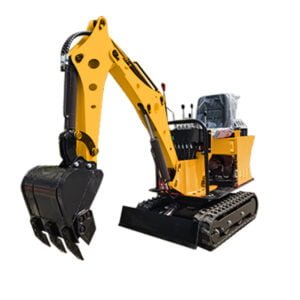Introduction
In the realm of construction, efficiency is the driving force that powers projects forward. When it comes to excavators, fuel efficiency stands as a critical factor that directly impacts both operational costs and environmental sustainability. As construction professionals strive for productivity and profit, the quest for the best excavator transcends power and capabilities to encompass a careful consideration of fuel consumption. This comprehensive exploration delves deep into the role of fuel efficiency in the selection of excavators, unraveling its significance, factors, and implications for construction projects.
Table of Contents
- Efficiency Redefined: The Significance of Fuel Efficiency in Excavators
- Fuel Efficiency Factors: Unveiling the Variables that Influence Consumption
- The Impact of Engine Technology: Tier Ratings and Innovation
- Hydraulic System Optimization: Balancing Power and Economy
- Idle Management and Auto-Idle: Navigating the Importance of Rest Periods
- Integrated GPS and Telematics: Precision and Fuel Savings in Operations
- Attachment-Specific Efficiency: Adapting for Optimal Fuel Consumption
- Operator Practices and Training: The Human Element in Fuel Efficiency
- Budget and Cost Considerations: Balancing Initial Investment and Long-Term Savings
- Environmental Responsibility: Aligning Fuel Efficiency with Sustainability Goals
- Comparative Analysis: Evaluating Fuel Efficiency Across Excavator Models
- ROI Calculation: Measuring the Economic Benefits of Fuel-Efficient Choices
- Resale Value and Future Proofing: Protecting Investment and Upgradability
- FAQ
1. Efficiency Redefined: The Significance of Fuel Efficiency in Excavators
Fuel efficiency isn’t just about saving on operating costs; it’s a strategic pillar that contributes to overall project efficiency, sustainability, and long-term profitability.
2. Fuel Efficiency Factors: Unveiling the Variables that Influence Consumption
Multiple factors influence fuel efficiency in excavators, including engine technology, hydraulic system design, operator practices, machine size, and attachment compatibility.
3. The Impact of Engine Technology: Tier Ratings and Innovation
Engine technology plays a crucial role in fuel efficiency. Excavators equipped with higher-tier engines are designed for better fuel economy, reduced emissions, and optimized power delivery.
4. Hydraulic System Optimization: Balancing Power and Economy
Hydraulic systems play a dual role in excavator fuel efficiency. Well-designed systems provide precise power delivery for tasks while minimizing energy loss and optimizing fuel consumption.
5. Idle Management and Auto-Idle: Navigating the Importance of Rest Periods
Idle management and auto-idle features prevent unnecessary fuel consumption during periods of inactivity. These features enhance efficiency by automatically reducing engine speed when not in use.
6. Integrated GPS and Telematics: Precision and Fuel Savings in Operations
Integrated GPS and telematics contribute to fuel efficiency by optimizing routes, work patterns, and equipment utilization. Precise operation reduces fuel waste and enhances productivity.
7. Attachment-Specific Efficiency: Adapting for Optimal Fuel Consumption
Different attachments require varying levels of power and fuel consumption. Optimal attachment selection and efficient usage contribute to overall fuel efficiency in diverse tasks.
8. Operator Practices and Training: The Human Element in Fuel Efficiency
Operator practices and training significantly impact fuel efficiency. Skilled operators who understand machine capabilities and practice efficient techniques contribute to reduced fuel consumption.
9. Budget and Cost Considerations: Balancing Initial Investment and Long-Term Savings
While fuel-efficient excavators may have a higher initial cost, their long-term savings through reduced fuel consumption often outweigh the upfront investment.
10. Environmental Responsibility: Aligning Fuel Efficiency with Sustainability Goals
Fuel efficiency aligns with environmental responsibility. Choosing fuel-efficient excavators demonstrates a commitment to sustainability by reducing carbon emissions and resource consumption.
11. Comparative Analysis: Evaluating Fuel Efficiency Across Excavator Models
Comparing fuel efficiency across excavator models involves analyzing specifications, engine technology, operational features, and manufacturer claims to make informed decisions.
12. ROI Calculation: Measuring the Economic Benefits of Fuel-Efficient Choices
Calculating return on investment (ROI) for fuel-efficient excavators considers factors such as fuel savings, operational efficiency, maintenance costs, and resale value.
13. Resale Value and Future Proofing: Protecting Investment and Upgradability
Fuel-efficient excavators often retain higher resale value due to their economic benefits. Investing in such machines protects the initial investment and ensures upgradability.
14. FAQ
Q1: Can fuel-efficient excavators handle heavy-duty tasks with power-intensive attachments?
Yes, fuel-efficient excavators are designed to balance power and fuel consumption. Advanced hydraulic systems and engine technology allow them to handle power-intensive tasks efficiently.
Q2: Are there industry standards or certifications for fuel efficiency in excavators?
Yes, various industry standards and certifications, such as Tier ratings for engines, indicate the fuel efficiency and emissions compliance of excavators.
Q3: How can operators contribute to fuel efficiency in excavators?
Operators can contribute to fuel efficiency by practicing smooth operation, minimizing idling, optimizing attachment usage, and staying informed about machine features that enhance fuel economy.
Q4: Are there tools or software available to monitor and optimize excavator fuel efficiency?
Yes, integrated GPS, telematics systems, and machine monitoring software can provide real-time data on fuel consumption, machine utilization, and areas for efficiency improvement.
Q5: Is fuel efficiency the sole consideration in choosing an excavator?
No, fuel efficiency is an important factor but should be considered alongside other critical aspects such as machine capabilities, performance, durability, operator comfort, and project requirements.
Q6: Do fuel-efficient excavators require more maintenance or specialized care?
Fuel-efficient excavators do not necessarily require more maintenance. However, proper maintenance and adherence to manufacturer guidelines are essential to ensure continued fuel efficiency over time.
Conclusion
Fuel efficiency is a multifaceted concept that transcends simple cost savings; it influences project efficiency, environmental responsibility, and the overall success of construction endeavors. As construction professionals navigate the landscape of excavator choices, the role of fuel efficiency emerges as a guiding principle that shapes decisions, influences operations, and contributes to a more sustainable and prosperous future. By understanding the intricate factors that impact fuel consumption and analyzing the comparative advantages of different excavator models, professionals can make informed choices that optimize both efficiency and excellence on job sites.



